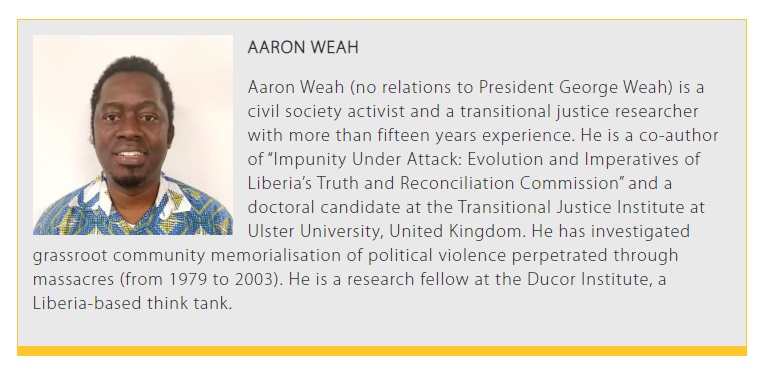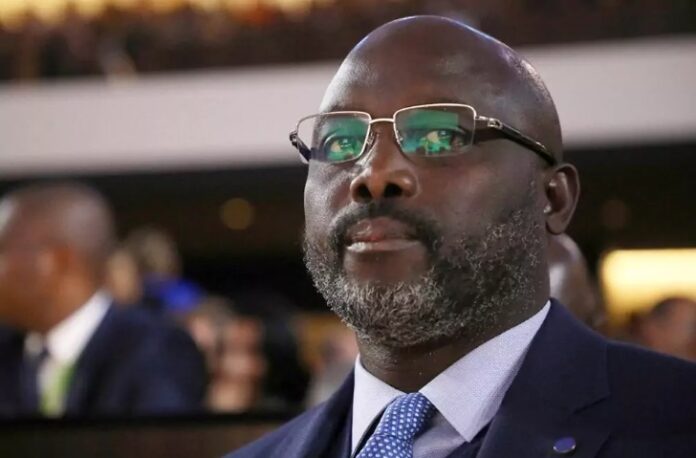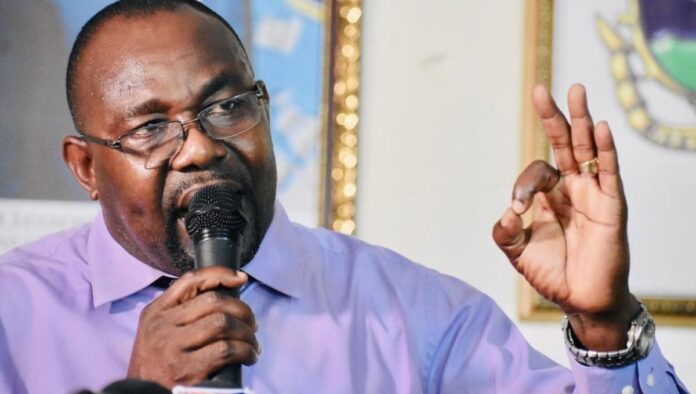An opinion by Aaron Weah
The first round of presidential elections in Liberia was held on October 10. What is the legacy of George Weah’s six-year presidency on justice for the crimes committed during the civil war? Before entering politics, the former international football star had called for the creation of a court to try war criminals. But such hope was dashed and impunity continues to prevail in the country, explains expert Aaron Weah.
In 2004, George Weah, then a UNICEF Goodwill Ambassador, called for the establishment of a war crimes court to prosecute those most responsible for the atrocities of the civil war in Liberia in the 1990’s and early 2000’s. Like many Liberians, Weah – a former football superstar – had himself suffered immensely from the violence. Some of his relatives were killed, and others gangraped. His properties, including houses and vehicles, were looted, vandalised; his entire estate in Monrovia was razed to the ground.
Weah’s early support for criminal accountability for civil war-era reverberated in his move into politics and the formation of Congress for Democratic Change (CDC). Around 2005 the Forum for the Establishment of the War Crimes Court was launched and was operated by his party’s stewards. This movement viewed Liberia’s Truth and Reconciliation Commission’s (TRC) truth-telling approach as a toothless bulldog, as the Forum’s chairman Mulbah Morlu told me in 2006. “The TRC is a waste of time, we need a war crimes court”, Morlu said then. I was at the time a young transitional justice rookie, supporting the TRC process. Morlu was appointed Chairman of the CDC in 2017, after George Weah became president of the country.
When George Weah was elected president in Liberia’s third post-war elections, the event was received with mixed reactions. His candidacy was endorsed and supported by one of Liberia’s most feared warlords, Senator Prince Y. Johnson. In 1990, Johnson had captured Liberia’s president Samuel K. Doe, tortured and mutilated him on camera – a video that went viral at the time. For others, Weah was inexperienced and didn’t understand governance. His three-year stint as senator left much to be desired. Yet, for some, Weah, relatively fresh-faced and from a deprived background, was a risk worth taking, a new social experiment at post-war governance, especially where the educated elites had supposedly ‘failed’ the society. In the imagination of most Liberians, he was the one person who could tear down the veil of collective amnesia, imposed by the elites after the TRC final report was released in June 2009, and have it replaced with a war crimes court.
IGNORING TRC RECOMMENDATIONS
The release of the TRC Report sent shock waves across Liberia’s political establishment. First and foremost, it recommended the establishment of an Extraordinary Tribunal to prosecute war crimes. Likewise, it recommended lustration and debarment from public office of former warlords, reparations for war victims, memorialisation for communities ravaged by the war. All through the report, it named names. One of the most consequential categories of the report was a list entitled: “Most Notorious Perpetrators.” On this list are 116 alleged perpetrators. On the list of recommended lustrations are former President Ellen Johnson Sirleaf, a former justice of the Supreme Court and several other prominent Liberians. Unlike in Sierra Leone where the civil war was launched and executed by those from the lower strata of society, Liberia’s war was perpetrated by the elites.
Not surprisingly, the TRC Report is banished from public offices and libraries. It is viewed as something of a stigma. During Johnson-Sirleaf’s administration (2006-2018), officials refused to talk about it, politicians avoided the subject when they could, and the private sector maintained a safe distance: the Government is by far the biggest employer and the one that awards some of the biggest contracts. But civil society remained unaffected by the politics of amnesia. That is why when Weah ran and campaigned on change, there was hope that he would do what Johnson-Sirleaf had failed to do: put together a team that review the TRC final report and start to undertake direct implementation, including the establishment of a war crimes court.
PRESIDENT GEORGE WEAH’S FLIP FLOPPING
However, a stocktaking of George Weah’s six years as president is as telling as former president Johnson Sirleaf’s failed attempt to embrace transitional justice as a critical part of Liberia’s post-war reconstruction.
Compared to Johnson-Sirleaf, Weah had far more political incentives to implement the TRC recommendations. He is not named in the TRC Report and was never involved in the civil war. He was in fact a victim. But in pursuit of power and to consolidate his grip on post-war politics, Weah abandoned his April 2004 call for criminal accountability. Instead, he ingratiated himself in the circle of Liberia’s post-war elites, most of them warlords, perpetrators, and those with ill-gotten wealth. He pandered to their influences and leaned on their assurances of re-election so long he ignored the TRC Report and focus on ‘true’ development.
In September 2019, in a written communication addressed to the legislature, Weah asked for “advice and guidance on all legislative and other necessary measures towards the implementation of the Truth and Reconciliation Commission Report, including the establishment of the Economic and War Crimes Court.” Few months after Weah flip flopped, indicating that Liberia must choose between development and reconciliation.
This was the turning point. Officials in government backed up the president by saying: Why should Weah be the one to set up a war crimes court when Johnson Sirleaf didn’t do it? Others with more cynical views suggested that the idea be subjected to a referendum.
JUSTICE OUTSIDE LIBERIA, IMPUNITY INSIDE
While the politics of silence on the TRC record waged on, a few Liberians with wartime records were arrested and tried in Western Europe and America. Some for lying about their past to immigration authorities; others for war crimes and crimes against humanity on the basis of universal jurisdiction. Ironically, the Liberian government under George Weah’s leadership opened the door to foreign investigators, a door that had remained shut during the entirety of Johnson Sirleaf’s presidency. The French, Swiss, and British were allowed access to investigate crime sites, talk to victims and gather evidence in cases against Liberian war criminals. The Finns were even allowed to hold a trial for months in Liberia against a Sierra Leonean war crimes suspect.
Why did the Weah administration allow this level of cooperation with European and American governments in the prosecution of Liberians in the diaspora but failed to do so domestically? Most Liberians arrested for lying on their immigration records were middle to low-level combatants. Only few cases have involved senior commanders or leaders of warring factions. George Boley, head of the inaptly named warring faction Liberia Peace Council (LPC) returned to Liberia in February 2012. Boley’s is the first ever U.S. deportation based on the use of child soldiers in war under the Child Soldier Accountability Act of 2008. But even though the LPC is notorious for committing 10.3% of serious crimes during the civil war according to the TRC final report, Boley was elected in the House of Representative after his return in 2017.
Moses Thomas, one of those named on the list of “Most Notorious Perpetrators” fled the United States in 2019 to avoid conviction for his role in the St. Peter Lutheran Church Massacre in Monrovia, the country’s capital city, in July 1990. This massacre is infamous for the slaughter of 600 persons, women, men, children, and the elderly. Four survivors of the church massacre filed a class action suit in February 2018 against Thomas, a former commander of the government’s Special Anti-Terrorist Unit. He was tried and convicted in absentia after he had fled to Liberia.
In September 2022, the Centre for Justice and Accountability, a U.S. NGO, and Debevoise and Plimpton law firm, in collaboration with the West Africa-based NGOs Institute for Human Rights and Development in Africa and Global Justice and Research Project, filed a complaint against the Republic of Liberia before the Nigeria-based ECOWAS Court of Justice for Liberia’s failure to provide justice and accountability for victims of the Lutheran Church massacre. But Thomas is back in Liberia, like Boley. And Liberia remains a haven for alleged or convicted war criminals.
MEMORIALS LACKING PURPOSE
At the grassroot level a certain kind of superficial remembering is taking place. The TRC uncovered 205 sites of massacres and recommended that a memorial be erected at each of these sites. Liberia’s Independent Human Rights Commission has been collaborating with the United Nations Development Programme (UNDP) to erect such memorials at some of these sites. In 2022, I spent six months travelling across the countryside, visiting, and examining these places. The memorials are mostly static monuments, some of them adorning the tradition style and structure of Liberia’s Palava Hut, an infrastructure for dispute resolution, while others are shapeless, lacking a clear and defined purpose. For the most part, these memorials are lacking in local ownership. Local residents interviewed said they would rather have memorialisation projects that came in the form of school, clinic or something much more practical than monuments designed in Monrovia and brought down for buy-in and legitimacy from central government and foreign donors. They don’t serve any specific purpose as there are no central message on justice or ‘Never Again’, and no engagement by local communities with the sites or memorials. In an interview with the Human Rights Commission’s transitional justice lead Joseph Blamiyon, he acknowledged that the processes leading up to the erection of these memorials are flawed and the outcomes are problematic. “There are no policies to guide the design and development of these memorialisation projects,” he told me.
In the latter part of Johnson-Sirleaf’s administration, she provided financial resources toward the support of the Du-port Road Memorial to civil war victims. Instead, the Weah administration has ostensibly relied on UNDP to finance all the memorial projects. No wonder the locals perceived these memorials as a clever attempt at check-listing some of the TRC recommendations.
While president George Weah has opened the door to European and American justice departments to enter Liberia and gather evidence to prosecute Liberians abroad, he has reneged on rolling out a domestic process to investigate and prosecute those most complicit in the civil war-era crimes. By ingratiating himself in the powerplay of crime-stained Liberian post-war elites, he has perpetuated the country’s culture of impunity. Source:: usticeinfo.net








